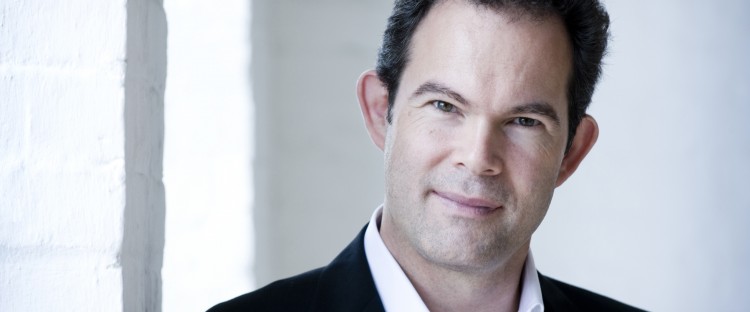 Gerald Finley has a baritone which casts a bass shadow. A voice dark and ripe and opulent that doesn’t lighten gladly, but the ear won’t mind two hours of it because Gerald Finley the dramatic interpreter and wizard of inflection comes with it.
Gerald Finley has a baritone which casts a bass shadow. A voice dark and ripe and opulent that doesn’t lighten gladly, but the ear won’t mind two hours of it because Gerald Finley the dramatic interpreter and wizard of inflection comes with it.
Finley and one of the most in-demand accompanists today, Julius Drake, presented a German and Russian program at Koerner Hall this past Sunday, April 22. The first part assembled poems by Goethe set to music by Beethoven and Schubert, two almost exact contemporaries (the older man died 1827, the young one the year after) whose songs however belong to two different eras. Beethoven is not known for his vocal music and next to Schubert’s songs his come across as plainer, simpler melodies, playful or curious rather than stirring. In Finley’s hands the songs grew to become little scenes, delivered smoothly in his precise enunciation.
Schubert’s Goethe was a different Goethe. The set was capped with arguably the best known Schubert song, the infanticidal Erl King, but began with the long Prometheus lied, D 674. The Prometheus of this poem is defiant, not yet punished by Zeus, proudly creating humans after his own image. At the time of its creation the song could have signified political rebellion against the powers of the state, or personal rebellion of young creative men against their fathers, but the text has lost much of its resonance for audiences of our time and is potentially overlong and self-important. Not here: again, Finley worked his magic with the text and the song became a meaningful cri de coeur.
An den Mond (To the Moon) stood out from the set by its languid pace and silvery lyrics, while An Schwager Kronos (To Coachman Chronos) swept though in a gallop.
The secondhalf, all-Russian, was shared between Tchaikovsky and Rachmaninoff. Tchaikovsky’s four songs came out as positively moderate next to the Rachmaninoff set. Rachmaninoff gives the pianist a lot to do, and is no stranger to a sweeping cinematic statement. An orchestra might have been present in the downers-with-high-dramatic-peaks O nyet, molyu, ne ukhodi! (Oh No, I Pray, Don’t Leave), O, dolgo budu ya (In the Silence of the Night), and Na smert chizhika (On the Death of a Linnet) but it was indeed just these two men onstage. A lot of chiaroscuro is required there, which Finley created through sensitivity to the text rather than vocal timbre (which stayed consistently as dark as plush velvet). Julius Drake from the keyboard supplied Romantic excess where Rachmaninoff calls for it.
One number in the Rachmaninoff set was actually fun: Sudba (Fate) – a song in which the singer voices more than one persona, in the vein of Schubert’s Erlkönig – had Finley (and us with him) delighting in the onomatopoeic sound of fate knocking on various people’s doors. The final song in the official program was the astonishing and astonishingly exaggerated Vesennye vody (Spring Streams), which starts by cranking up to 10 and stays there for its remaining two minutes. But Finley and Drake made it sound almost natural.
The encore was reserved for songs in the English language – Barber, Copland, Healey Willan, and a Britten arrangement of The Crocodile, a folk song recounting how a man ended up eaten up by the gigantic reptile and spent ten years inside it, “very well contented.”
As was the audience on this night.
Gerald Finley and Julius Drake presented a recital program on April 22, at Koerner Hall, Toronto. They continue to tour this program to Washington DC, Georgia and NYC. Finley will have an extra stop in Montreal, with pianist Michael McMahon (Info).
Lydia Perović is an arts journalist in Toronto. Send her your art-of-song news at artofsong@thewholenote.com.



